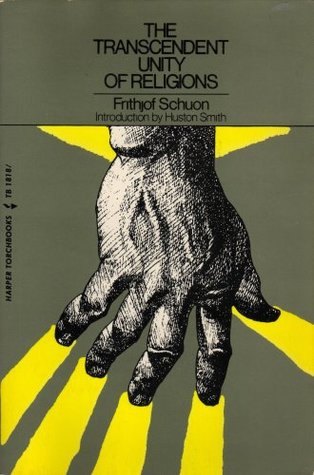

 |

|

The average rating for The transcendent unity of religions based on 2 reviews is 3.5 stars.
Review # 1 was written on 2015-11-04 00:00:00 Kelli Street Kelli StreetBooks like this are hard to review as they tread in areas where language simply becomes inadequate. Anything that is put on paper doesn’t seem to capture it; Huston Smith says in the introduction that “the truth…is buried so deep in the human composite that they cannot communicate it, not in any way the majority will find convincing.” (xv) So, we can resort to talking about things like duality, the conflict of opposites, resolution of contradictions in ultimate reality, etc… But ultimately transcendence is precisely that, transcendent - over and above, encompassing everything yet at the same time and for that very reason, indescribable. There is the deepest of truths here, and one that sometimes shows itself in flashes of illumination that contain ultimate happiness. At a certain level, religions are nothing more than symbols that point to a higher reality. For me personally, it took the insights of Islam to reveal this, but it could just as easily have evolved (and still did in many ways) out of my Christian past. It could have come from any revealed religion. Islam in its own right is incredibly universal even on the surface. The Qur’an has many verses that point to the acceptance of all revealed religions as containing the primordial truth. Schuon himself as a Sufi can be said to derive his primary “language” and inspiration from this perspective. Focusing on one path over others is necessary on the level of lived experience. This is one of the main arguments of the Perennialist approach to religion. To communicate and reach the desired result, there are systems in place that don’t make spiritual sense when intermixed. This is where the Perennialists – led by Schuon and Rene Guenon among others – should not be confused with a simplistic sentimental universality that is prone to compromise. It makes it tough when searching for a way to apply their insights to a world that desperately needs it on the pragmatic (exoteric) level. To them, this higher transcendence is only truly realized by a few, on an esoteric level. This is not so much an elitist view as an observation and insight. The exoteric/esoteric vertical progression is the key to understanding Schuon. As Huston Smith lays out in the introduction, this is the primary way Schuon looks at the differences in religion, vs. the common method of simply finding symbolic counterparts between different faiths. His insight is that the manifested differences on the exoteric level of religion are ultimately resolved, transcended and eliminated in the essence of the One. There is great wisdom here through holding ideas in tension – meaning that we can cling to one path as the truth while at the same time acknowledging that ultimate reality is beyond comprehension and big enough to include it all. |
Review # 2 was written on 2019-02-26 00:00:00 Dwayne A Day Dwayne A DayOne of the most tedious trends in twentieth-century academia is the endless proliferation of relativist "religious studies" / "comparative religion" / "multicultural studies" b.s. about how all world religions are really the same. I feel like it should be painfully obvious to everyone why this is not true -- while there is indeed a very basic similarity to most religions (i.e., "renounce your ego in some fashion," "there is some sort of ultimate ontological grounding that is not immediately apparent to the senses"), and while there are some fascinating connections between, e.g., Sufism and Orthodox Christianity, the idea that all religions are really the same could only occur to someone who has (1) not entered deeply into any one tradition and/or (2) is a religious studies professor. All religions do not, to put it lightly (contra Rudolf Otto and everyone after him, up to and including John Hick), have the same 'core experience' that is somehow 'translated' into different religions. This would be like saying that there's really only one human emotion, called "emotion," that is then translated into anger, fear, joy, ecstasy, love, etc.; anyone who has actually experienced these emotions knows that this is comically false. In other words, I think it's fair to say that left-hand path Tantric orgies, or the Chöd sādhana of Tibetan Buddhism (where one offers one's own body to be consumed by demons), are maybe just a tiny bit different -- experientally, dogmatically, etc. -- than the experience of Anglicans at prayer. I understand the motives behind the hermeticist spiritualism / perennial philosophy of Schuon as well as the present-day 'spiritual but not religious' crowd; they all mean well, I think. I also understand the anodyne let's-all-get-along vibe behind wanting all religions to be combined in a vague United Nations melting pot of mainstream liberal niceness, where there are no sharp edges and no one takes religion too seriously, and every Muslim and Christian realizes that their truth is only true for them -- and, naturally, that the only absolute truth is the 'rights' and 'tolerance' language of the late-capitalist liberal/secular state -- but the facts on the ground do not bear this out. |
CAN'T FIND WHAT YOU'RE LOOKING FOR? CLICK HERE!!!